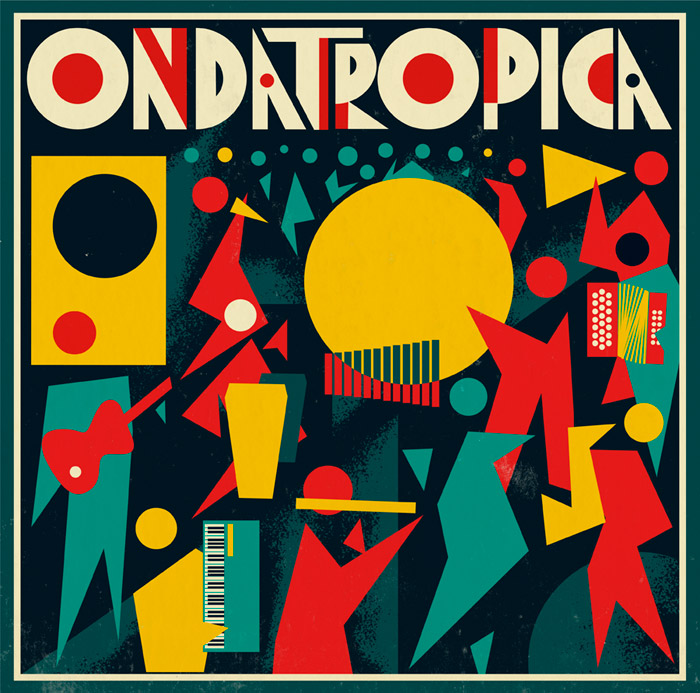Reviews July 24, 2012
Ondatropica
Regardless of how you approach it, Ondatropica, the new album produced by the team of Will Holland (aka Quantic) and Mario Galeano, is a major piece of work. Recorded during a three-week long session held at the legendary Discos Fuentes studio in Bogotá, the record features over 40 musicians, their multi-generational ranks including everyone from elderly folkloric masters (at least ten of the musicians were over seventy) to leading lights from Bogota’s current music scene. The result is an almost flawless double disc set of shocking variety and dense accomplishment. Based on a variety of traditional forms and instruments drawn from across the country, the album exudes a dank, earthy intensity. Accordions rub shoulders with percussive armies, while ranked masses of brass duel with equally powerful vocals. The tracks are remarkably full, their breathtaking details betraying the lifetimes of musical knowledge present in performer’s fingertips.
Taken as a whole, the project stands as a living testament to the richness of Colombia’s musical culture. Rather than a love letter to a legendary past, it’s an album that is powerfully in the present tense; although it draws on veterans and references the golden years, it does so in the service of the music’s future. As such, it is a crowning achievement of a long restorative effort made by both of its principle creators. Going beyond the excavation of vintage music showcased on compilations like Holland’s The Original Sound of Cumbia or the recreation of bands like Galeano’s Frente Cumbiero, Ondatropica is a near miraculous act of time travel, a fusion of past and future that points towards a twisted zone in which both can not only happily coexist, but buy each other well deserved rounds of drinks.
Unlike many cross-generational collaborations, in which one or the other hold more influence (think remixes vs. the Buena Vista Social Club), the collaborations on Ondatropica seem remarkably equitable. On songs like the standout “Suena,” the structure of the beat was clearly written by someone fluent with hip-hop. Yet the loose groove of the percussion is a far cry from a drum machine’s endlessly boxed repetition, and the joy that bubbles up through the fills defines the sound of the track. Over all this, a female MC drops nation repping verses before the song ends in a full-blown instumental rave-up.
This kind of fusion between old and new is helped by current trends in dance music, many of which have been moving away from colder electronic timbres and towards the development of a rawer, more organically twisted sound, one that is often achieved by a direct reference to the music of the past. As a result, the natural wavers and bent notes of the flutes and horns played by the traditional musicians create a sound and vibe that wouldn’t be out of place next to newer styles of cumbia. At the same time, it’s important to note that this influence cuts both ways, and the fuller, more rhythmically driven feel of modern dance music definitely pervades this album. As if in response to these challengers, the players on Ondatropica perform with such voracious intensity that they are able to hold their own against any and all digital upstarts.
A perfect example of this occurs midway through the first disk. “3 Reyes De La Terapia,” a creeping beat-box fever dream wreathed in dubby echo, is easily one of the most modern tracks on the album. And yet there is no disjunction between it and “Libya,” the far more traditional piece that immediately follows. Although “Libya” doesn’t have the strange effects of its predecessor, its woozy, almost psychedelic groove contains its own powers of disruption, conjuring a vibe that is somehow threatening and joyful at the same time.
Tracks like this are why the album is such a triumph. Not simply because it brings together disparate styles and generations of musicians, but because their collisions reveal hidden depths in everyone involved. Rap becomes rooted in history, dub and ska are added to cumbia, and salsa displays its subterranean strangeness. Everything is taken as folklore, and everything is therefore made to reflect the spirit of the place from which it came and of which it continues to be a living part. After the decades of unrest that scarred Colombia’s music scene, Ondatropica is a powerful argument for the richness, depth, and variety of the nation’s often underappreciated musical culture. It is a master-class in any number of musical genres. It is among the best examples of cross-generational fusion ever made. And it swings like all hell.








